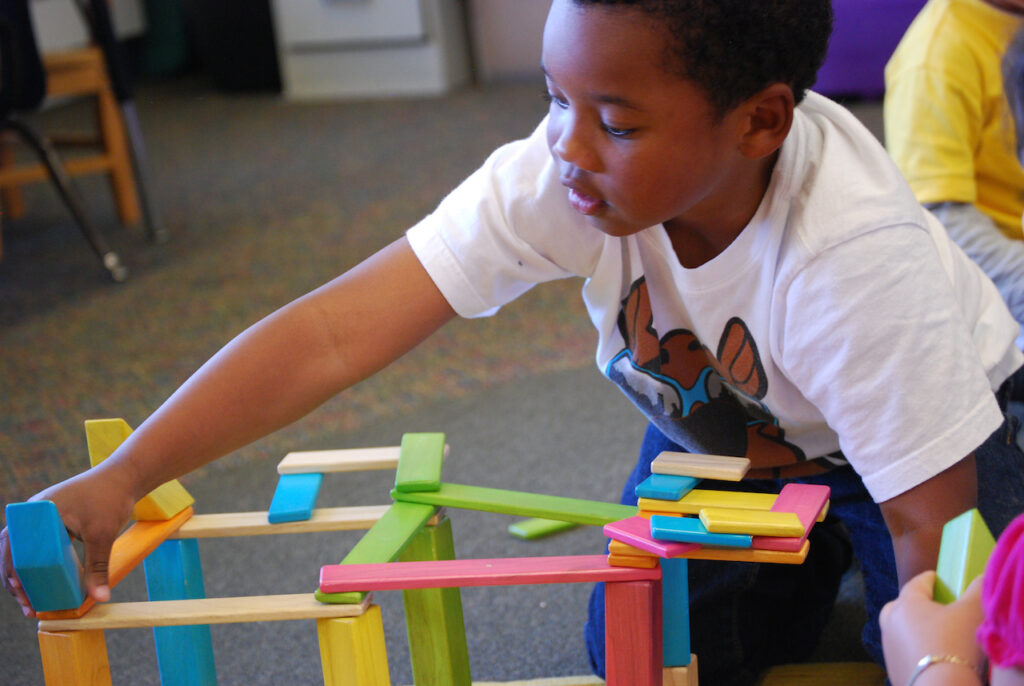Expulsion of preschoolers: ‘Let’s take that option off the table’
 Credit: Lillian Mongeau/EdSource Today
Credit: Lillian Mongeau/EdSource Today
A boy builds a tower at his state preschool programme in East Palo Alto.
 Credit: Lillian Mongeau/EdSource Today
Credit: Lillian Mongeau/EdSource Today
A boy builds a tower at his country preschool program in Eastward Palo Alto.
Children who are expelled or suspended from preschool are more likely to have problems – including higher rates of incarceration – afterwards in life, according to new report titledPoint of Entry: The Preschool-to-Prison Pipeline.
Preschoolers in public programs, according to inquiry from the U.S. Department of Educational activity's Part for Civil Rights cited in the report, were expelled at more three times the rate of K-12 students in 2014.
Beliefs that can lead to suspension or expulsion, such as being defiant to adults or ambitious to other children, may signal a need for counseling or mental health support, according to the report by the progressive policy grouping Centre for American Progress. Exclusion from school used to be a last resort, but has go "wildly overused and disproportionately practical to children of color," the report states.
"The school to prison pipeline is non a natural miracle," said Maryam Adamu, one of the study'south authors, in a recent interview with EdSource. "It's so important in the early years that subject area practices are developmentally appropriate. At that place are ways that schools imitate the criminal justice system."
The report, released in October, examines a range of research on suspensions and expulsions in preschool settings. The findings include:
- African-American preschoolers were the nigh likely to exist enrolled in low-quality preschool and the least likely to be enrolled in loftier-quality preschool.
- African-American children brand up eighteen percent of enrollment in public preschool, simply they business relationship for 42 percent of out-of-school suspensions and 48 percent of those receiving multiple suspensions. (A recent study of young students in Texas establish similar disparities.)
- Immature students who are suspended or expelled are "several times more likely to feel disciplinary action later on in their bookish career; drop out or fail out of high schoolhouse; report feeling disconnected from schoolhouse; and be incarcerated after in life."
Adamu believes that early on childhood education, and the positive or negative experiences during that time, can accept an outsize bear on on a child'due south hereafter: "Xc pct of brain development occurs from 0 to 5. Those are the years when kids larn to label themselves in a certain way. How they acquire to perceive schoolhouse and adults in charge tin can follow them throughout their life."
The study makes policy recommendations, including prohibiting suspensions and expulsions in early childhood settings, expanding access to childhood mental wellness support services, and providing increased professional development for teachers that focuses on classroom direction in racially various preschools.
Adamu said only about 20 per centum of teachers and providers serving children nether v reported receiving specific training on facilitating children's social and emotional growth in the past yr, according to research from the 2022 National Survey of Early Care and Teaching. "Young children are just learning impulse command, they are figuring out how to be with other kids and react to adults. The more teachers are trained to navigate behavioral issues that arise, the better the school experiences and the lower the chance of expulsion."
Higher quality preschool programs also feature smaller form sizes that can help reduce behavior problems that lead to suspensions or expulsions. "When child-to-developed ratios are higher, discipline situations are harder to deal with," said Adamu. "Access to screening and referral services can also give teachers improve tools. Instead of pushing kids out of the schoolhouse, connect them with help."
"Too often the merely option is suspending kids," she said. "Let'south take that option off the table."
To get more than reports like this one, click here to sign up for EdSource'southward no-cost daily e-mail on latest developments in pedagogy.
Source: https://edsource.org/2015/expulsion-of-preschoolers-lets-take-that-option-off-the-table/90150
0 Response to "Expulsion of preschoolers: ‘Let’s take that option off the table’"
Post a Comment